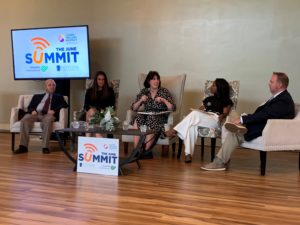 “Inclusion sits at the heart of our values,” said Siobhan Barrington, Vice President and Chief Operating Officer of Partnerships for People, a KHS subsidiary in New Jersey. “We’re committed to creating inclusive communities. But there’s more work to be done to move from being person-centered to being person-led.”
“Inclusion sits at the heart of our values,” said Siobhan Barrington, Vice President and Chief Operating Officer of Partnerships for People, a KHS subsidiary in New Jersey. “We’re committed to creating inclusive communities. But there’s more work to be done to move from being person-centered to being person-led.”
On June 22 at the June Summit, we launched our 12-month project to incorporate the international Listen Include Respect guidelines into our work. These guidelines, developed by people with intellectual disability with support from Inclusion International and Down Syndrome International, serve as global standards for how organizations across all sectors can include people with intellectual disability within their work.
“Keystone Human Services was founded 50 years ago on the idea of inclusion,” said Chuck Sweeder, President-Elect of Keystone Human Services. “Our mission and values have remained clear, but we are always looking to grow, improve, and challenge ourselves. What can we be doing better? We’re going to spend the next year exploring how these guidelines impact our work and what meaningful participation truly means for people with intellectual disability.”
Much of that work centers on the ideas of good support and what it means to provide good support. During the panel discussion, Leah Klish, Education Director for Keystone Human Services, shared a story about how she and a friend ran into a colleague and the person they supported in the mall one day around the holidays, and they stopped to chat. The remarkable thing about this wholly unremarkable occurrence is exactly that: it was unremarkable to anyone else in the mall. It just looked like four friends having a conversation.
That’s the beauty of good support. It’s unseen. It’s undetectable. It looks like everyday life. But the impact of good support is profound. It directly impacts how people see people with disability and the people providing support.
Although we see everyone within our organization as contributors to support, it is Direct Support Professionals who have the most direct impact in the lives of the people who choose services from Keystone Human Services. Our goal is to strengthen knowledge about human rights, so that Direct Support Professionals see themselves not as caregivers, but as advocates and partners with the people they’re supporting.
As Sue Swenson, President of Inclusion International and the evening’s keynote speaker said, “The work of Direct Support Professionals is about human rights. It’s about listening, including, and respecting people with disabilities.”
We have put together a work group to dive into the guidelines and begin working through how we can embed the Listen Include Respect guidelines into what we do every day. We’re partnering with people with intellectual disability for this work.
“Self-advocates are the experts,” said Bill Krebs, Advocacy Coordinator for KHS. “We’re the best resources for what we need in our own lives.”
We expect the coming year to be challenging, but we also know it will be transformative. Our very culture will change. “The greatest impact will be moving from a ‘why’ culture to a ‘why not’ culture,” said Nathan Gerhard, Associate Executive Director for the North Central Region of PA within our Intellectual Disability Services. “Once you get the answer to why something is the way it is, question why it has to be that way. Don’t simply accept the answer, but challenge it. Challenge the way we’ve always done things.”
What we know is that everyone benefits when all people are included and can fully participate. As Ailis Hardy, Self-Advocacy Program Manager for Inclusion International said, “No one is too disabled to take part.”
“We begin our work with an assumption of competence,” said Genevieve Fitzgibbon, Deputy Directory of Keystone Human Services International. “We are partners and allies, not caretakers. Together, we’re deepening our understanding of rights and responsibilities and how to learn together.”
Everyone has rights. Everyone has a voice. And the world is a better place when everyone’s voice is heard, respected, and included.


 “Inclusion sits at the heart of our values,” said Siobhan Barrington, Vice President and Chief Operating Officer of Partnerships for People, a KHS subsidiary in New Jersey. “We’re committed to creating inclusive communities. But there’s more work to be done to move from being person-centered to being person-led.”
“Inclusion sits at the heart of our values,” said Siobhan Barrington, Vice President and Chief Operating Officer of Partnerships for People, a KHS subsidiary in New Jersey. “We’re committed to creating inclusive communities. But there’s more work to be done to move from being person-centered to being person-led.”